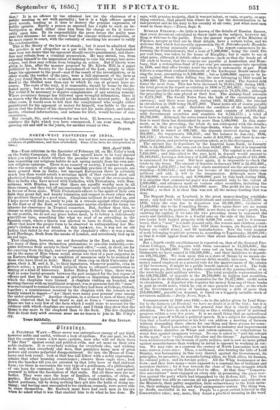NORTH-WEST PROVINCES OP INDIA.
(The following letter has been long in type, but had first been postponed by the accidents of publication, and then overlooked. Some of its facts are independent of time) 20th April 1856. fint—Your criticism in the Spectator of February 16, on Mr. Coley's book on the Sutlej Campaign, old Indians like myself know to be very shrewd when you express a doubt whether the peculiar views of the retired chap- lain respecting our religious habits do not spring mainly from his own nar- row religious opinions. There is no country or society, I venture to assert, where the essence of religion and the unselfish practice of its precepts are more general than in India; but amongst Europeans there is certainly much less than would satisfy a sectarian spirit of that outward show and pharisaical formality which seem requisite to the eyes of the over-zealous. Men in India who have mixed with Catholics, with Protestants, with Mus- sulmans, with Hindus, know that there are equally worthy men in all those classes, and they rub off unconsciously their early exclusive prejudices in favour of form alone. While Protestants adhere to the spirit of their own faith they grant full and hearty toleration and respect to every other when the professor thereof is a good man. Chaplains militant do not find us, and I hope never will find us, ready to join in a crusade against other religions in the East or of the East, or to countenance unwise sticklers for forms too irksome for observance in Tropical countries. But, further than this, to charge us with irreligion, because on a campaign, with the smell of powder in our nostrils, we do not say grace before meat, is to betray a ridiculously punctilious turn, something like what we read of as prevailing in the 'Spanish court, where a Queen was allowed to burn to death, because the officer that knew the proper form to be observed in extinguishing her Ma- Inty's clothes was not at hand. In this instance, too, it was not an old Indian that failed in due attention to the chaplain's Office : it was a man, Lord Hardinge, fresh from the smoke of London, and notoriously tied up in its red tape.
That chaplains, however, are not favourites in the East, is quite true. Too many of them give themselves pretensions to oracular authority,—re- quire deference from society to their f0 sacred office,"—and, in short, are far too exacting from the high, and too patronizing towards the low, for teach- ers in the name of Him whose social status was that of a poor carpenter in an Eastern fishing-village (a condition of meanness only to be realized by those who have lived in Asia). Many of them clap on their University de- grees, their A. M. and A. B. to their signatures, whenever possible, even in private notes a practice which subjects them to offensive construction as aiming at a kind of hierocracy. Before Bishop Heber's time, there was a wall in some burial-grounds between the part assigned for the last repose of officers and that for the remains of privates—a disgusting distinction for which the chaplains were blamed. A chaplain visiting an hospital, and meeting therein with an intelligent sergeant, was so gracious that the "man" Was encouraged to remind his reverence that they had been at College, Oxford, together ; a reminiscence received by the chaplain with the remark as he hastily turned to depart—" Aw .1. there were many poor persons' sons among the under-graduates." Another chaplain, in a sermon to men of three regi- ments, observed that he had heard so Cad so from a "common soldier." These are but a very few of the facts which I could state to account for the coldness with which chaplains are regarded; and I think they show that the blame is due more to the shepherd than to the flock. The few chaplains that do their duty with common sense see no reason to join in Mr. Orders My.


































 Previous page
Previous page